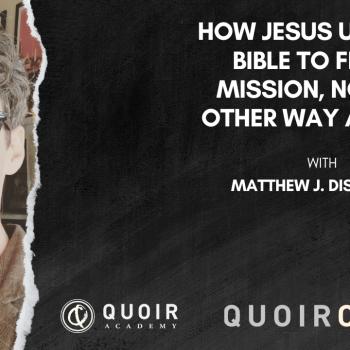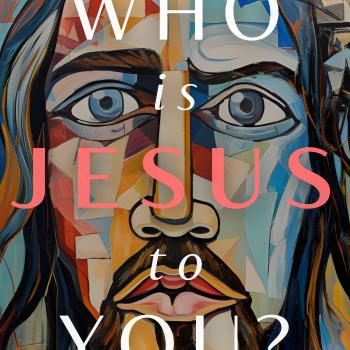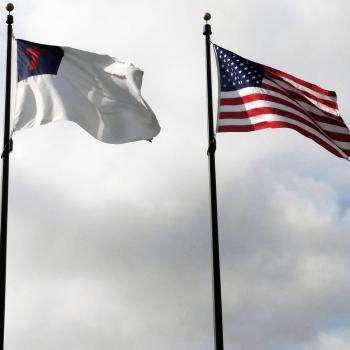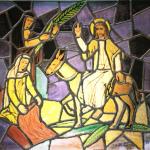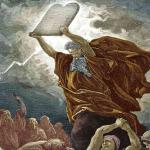
We all love power. We long for it, desire it, even covet it. Power gives us a sense of control, a sense of stability and permanence. It makes us feel like heroic conquerors, that we can stand over and against situations and people we don’t like, with our hands raised high like the champion boxers we think we are. And even when we ourselves cannot exert this power, we tend to turn toward those who can do it for us. That is why, for example, we often elect such shitty politicians—they tend to be the folks who are uncannily good at getting their hands on that covetous thing we call power.
But that’s not exactly what happens on Palm Sunday. Sure, the whole event is about power. That’s what the waving of palm branches is all about, as my friend and co-host of the Heretic Happy Hour podcast, Keith Giles, points out:
Those palm branches were a direct throwback to the Maccabean period when the triumphant Jewish warriors rode into Jerusalem and the people celebrated their victory over the Seleucids, which incidentally was followed immediately by a ritual cleansing of the temple. At that time the people waved palm branches as a symbol of military conquest over an oppressive enemy. By waving those palm branches, the people are saying that they are ready for war. They are ready for the blood of the Romans to be spilled in an uprising that they hope Jesus will lead them in.
And Keith is absolutely correct here. This event is indeed about conquering. It’s about raising one’s hands in triumph. Beautifully, and ironically, the Palm Sunday narrative flips the traditional notion of power right on its head. Indeed, it is the complete and utter subversion of power.
So, what is Palm Sunday? In short, it’s a day celebrated by Christians as it marks Jesus’ “triumphal” entry into Jerusalem just prior to his arrest, execution, and resurrection. Matthew 21:1–11 tells the story like this:
“When they had come near Jerusalem and had reached Bethphage, at the Mount of Olives, Jesus sent two disciples, saying to them, ‘Go into the village ahead of you, and immediately you will find a donkey tied, and a colt with her; untie them and bring them to me. If anyone says anything to you, just say this, ‘The Lord needs them.’ And he will send them immediately.’ This took place to fulfilled what had been spoken through the prophet, saying, ‘Tell the daughter of Zion, look, your king is coming to you, humble, and mounted on a donkey, and on a colt, the foal of a donkey.’ The disciples went and did as Jesus had directed them; they brought the donkey and the colt, and put their cloaks on them, and he sat on them. A very large crowd spread their cloaks on the road, and others cut branches from the trees and spread them on the road. The crowds that went ahead of him and that followed were shouting, ‘Hosanna to the Son of David! Blessed is the one who comes in the name of the Lord! Hosanna in the highest heaven!’ When he entered Jerusalem, the whole city was in turmoil, asking, ‘Who is this?’ The crowds were saying, ‘This is the prophet Jesus from Nazareth in Galilee.’”
A couple things are important for us to consider.
First off, notice what Jesus is called: “king.” This is crucial because one simply does not declare a poor, dusty-footed Jewish prophet named Jesus as “king” without there being some grave consequences. To declare Jesus as king is to declare that Caesar is not. There are no two ways about it. I believe that is why, earlier in his ministry, Jesus gets rather nervous when the crowds want to force him to be their king (John 6:15). In fact, Jesus is so anxiety-ridden that he gets the hell out of there and heads into the mountains so that he can escape the consequences of such a declaration.
But here he is, entering Jerusalem as a king. However, he is no normal king. He is no Caesar. The way in which Caesar conducted business was through force, and fear, and bloodshed; he was the human epitome of power. In fact, he was even viewed as a god. As Fr. John Dear notices:
We’re so used to that word “Gospel,” that it’s lost its original meaning. But in those days, when the Roman empire went off and conquered another land in the name of their god Caesar, and killed all the men, raped all the women, and destroyed all the homes, the soldiers would come back parading through the land announcing “the Gospel according to Caesar,” the Good News of the latest victory of Caesar, that another land has been conquered for their god Caesar, and that Caesar’s enemies have been killed.
Jesus’ Good News, on the other hand, could not be more different. Instead of riding into town on a proud war-horse, Jesus enters atop a colt and an ass. Incidentally, this is prophesied by Zechariah:
Rejoice greatly, O daughter Zion! Shout aloud, O daughter Jerusalem! Lo, your king comes to you; triumphant and victorious is he, humble and riding on a donkey, on a colt, the foal of a donkey. (v. 9)
The prophecy continues, cutting right to the heart of the matter:
He will cut off the chariot from Ephraim and the war-horse from Jerusalem; and the battle bow shall be cut off, and he shall command peace to the nations; his dominion shall be from sea to sea, and from the River to the ends of the earth. (v. 10)
Again, this is so subversive it would have been impossible for Rome not to notice. Rome was in charge of peace—peace through powerful force and coercion. And their dominion was from sea to shining sea. Jesus’ peace, on the other hand, is not put on display through force. In fact, that sort of peace—Pax Romana as it was known—is striped of all its power by Jesus, for without chariots, war horses, and battle bows, how can power and force truly be displayed?
It can’t!
This is just one reason why Jesus had to be done away with. As the story progresses over the course of a week, there will be more. He’s just too damn subversive. Our human kingdoms simply cannot handle this sort of thing. Our kingdoms need power over others. Our kingdoms need force as our most trusted tool. Our kingdoms need weapons of war. The kingdom of God, however—the kingdom Jesus spent his life striving to bring about—has no room for such things. It’s a kingdom of love, of humility, of service, of grace, of mercy, and of compassion. It’s a kingdom inaugurated by the radical forgiveness of the enemy other. Indeed, it’s an incomprehensible kingdom, inaugurated by an incomprehensible Messiah. But it’s a kingdom that is always a reality, should we choose to live in it.
So, wave those branches. Celebrate victory. For the king—the Prince of Peace—is here in our midst, just like the kingdom of God is. Just like it will always be.
Shalom.








